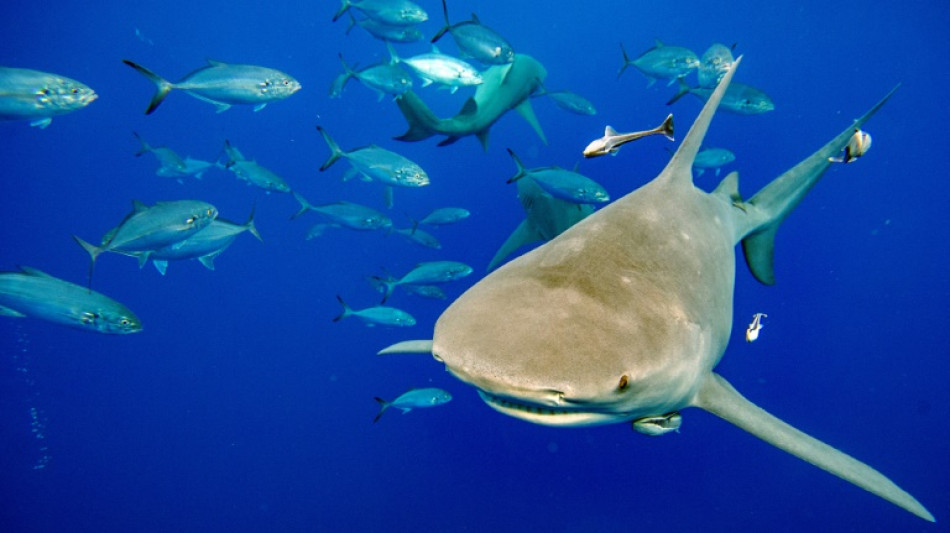
-
 Germany's Merz to visit China next week
Germany's Merz to visit China next week
-
Kompany says Mourinho made 'huge mistake' in Vinicius racism row

-
 X appeals EU's 120-mn-euro fine over digital content violations
X appeals EU's 120-mn-euro fine over digital content violations
-
Galthie recalls hulking locks Flament, Meafou for Italy

-
 Turkey, Saudi sign major solar power deal
Turkey, Saudi sign major solar power deal
-
US Olympic freeskier Hess embraces 'loser' tag after Trump blast

-
 European stocks rebound, oil prices ease after US-Iran volatility
European stocks rebound, oil prices ease after US-Iran volatility
-
'Alpha male' AI world shuts out women: computing prof Hall

-
 New Zealand freestyle skier Ives in hard Olympic crash
New Zealand freestyle skier Ives in hard Olympic crash
-
New Zealand must adapt quickly to Sri Lanka wickets: Chapman

-
 Thai activist's jail term for royal insult extended to 30 years
Thai activist's jail term for royal insult extended to 30 years
-
Families of Duterte's drug war victims eye Hague hearing with hope

-
 India chases 'DeepSeek moment' with homegrown AI
India chases 'DeepSeek moment' with homegrown AI
-
UN touts panel for 'human control' of AI at global summit

-
 Ukraine Paralympics team to boycott Opening Ceremony over Russian flag decision: statement
Ukraine Paralympics team to boycott Opening Ceremony over Russian flag decision: statement
-
UK monarchy reels from Andrew's stunning arrest

-
 Somaliland, where Muslims love Israel
Somaliland, where Muslims love Israel
-
Florida airport to be renamed after US President Donald Trump

-
 Fans flock to Japan zoo to see viral baby monkey Punch
Fans flock to Japan zoo to see viral baby monkey Punch
-
Stocks mixed, oil rises after Trump Iran threat

-
 Outspoken Laos lawmaker's election exit sparks rare dissent
Outspoken Laos lawmaker's election exit sparks rare dissent
-
Kim Jong Un vows to boost living standards as he opens rare congress

-
 Shepherd hat-trick to Samra ton: Five top T20 World Cup performances so far
Shepherd hat-trick to Samra ton: Five top T20 World Cup performances so far
-
Zimbabwe surprise as T20 World Cup Super Eights begin without Australia

-
 Victorious Takaichi promises 'strong and prosperous' Japan
Victorious Takaichi promises 'strong and prosperous' Japan
-
Ex-South Korea leader apologises for martial law crisis

-
 Ex-S. Korea leader apologises for martial law crisis
Ex-S. Korea leader apologises for martial law crisis
-
Messi kicks off MLS season in key World Cup year

-
 Teen burnout to Olympic gold: Alysa Liu 'looking to inspire others'
Teen burnout to Olympic gold: Alysa Liu 'looking to inspire others'
-
Cunningham stars as NBA-leading Pistons ease past Knicks

-
 Andre Gomes joins MLS side Columbus Crew
Andre Gomes joins MLS side Columbus Crew
-
Scottish inconsistency 'bugs everyone' says former international Beattie

-
 England turn to Pollock for Six Nations boost against Ireland
England turn to Pollock for Six Nations boost against Ireland
-
Arsenal aim to banish title jitters in Spurs showdown

-
 Scrutiny on Flick rises as Barca seek recovery
Scrutiny on Flick rises as Barca seek recovery
-
Leipzig host red-hot Dortmund with Champions League hopes slipping away

-
 Nvidia nears deal for scaled-down investment in OpenAI: report
Nvidia nears deal for scaled-down investment in OpenAI: report
-
Japan inflation eases in welcome news for PM Takaichi

-
 McIlroy shares Riviera clubhouse lead as Rai charges, Scheffler fades
McIlroy shares Riviera clubhouse lead as Rai charges, Scheffler fades
-
Philippines' Duterte earned global infamy, praise at home

-
 Stocks drop, oil rises after Trump Iran threat
Stocks drop, oil rises after Trump Iran threat
-
As European heads roll from Epstein links, US fallout muted

-
 Families of Duterte's drug war victims eye Hague hearing hopefully
Families of Duterte's drug war victims eye Hague hearing hopefully
-
Russian decision is a betrayal: Ukrainian Paralympics chief

-
 Venezuela parliament unanimously approves amnesty law
Venezuela parliament unanimously approves amnesty law
-
Martinez missing as Inter limp to Lecce after Bodo/Glimt humbling

-
 India chases 'DeepSeek moment' with homegrown AI models
India chases 'DeepSeek moment' with homegrown AI models
-
World leaders to declare shared stance on AI at India summit

-
 'Everything was removed': Gambians share pain with FGM ban in balance
'Everything was removed': Gambians share pain with FGM ban in balance
-
Kim Jong Un opens rare party congress in North Korea


Five key decisions at global wildlife summit
A global wildlife summit that ends Friday passed resolutions to protect hundreds of threatened species, including sharks, reptiles, turtles as well as trees.
Here are some highlights of the two-week meeting of the Convention on International Trade in Endangered Species (CITES) in Panama.
1) Sharks steal the show
No longer just the villains of the deep, these ancient predators were the stars of the summit.
Delegates from more than 180 countries agreed to regulate the trade in 54 species of the requiem shark and hammerhead shark families.
These species are the most hunted for their shark fins -- seen as a delicacy in some Asian countries -- and their numbers have been decimated, putting the entire marine ecosystem at risk.
Only Japan grumbled over the resolution, arguing restrictions on the trade of the blue shark would be a blow to the livelihoods of its fishermen.
CITES also voted to restrict the trade of guitarfish rays and several other freshwater ray species.
2) See-through glass frogs
The skin of these nocturnal amphibians can be lime green or so translucent their organs are visible through their skin.
This has made them sought-after pets, and intense trafficking has placed the species in critical danger.
CITES also placed more than 160 species of glass frog, found in several rainforests in Central and South America, on its Appendix II, which places trade restrictions on threatened species.
The European Union and Canada withdrew early reservations about the resolution, which was adopted unanimously.
3) Weird and wonderful turtles
CITES approved varying levels of protection for around 20 turtle species from America and Asia.
These include the striking matamata turtles, with their prehistoric, beetle-like appearance, which have also become sought-after pets and are hunted for their meat and eggs.
They live in the Amazon and Orinoco basins, but scientists do not know how many there are.
Freshwater turtles are among the most-trafficked species in the world.
The unusual-looking North American Alligator Snapping Turtle was also granted trade protection.
4) Crocodile bans lifted
Brazil and the Philippines now will be able to export farm-raised crocodiles, after a total trade ban was lifted.
Delegates also allowed the export of skin and meat of the broad-snouted caiman -- found in the wild in the Brazilian Amazon and Pantanal as well as wetlands, rivers, and lakes of neighboring countries.
"The population of these animals is very big. There has been a great reproductive success," said researcher Miryam Venegas-Anaya, a crocodile expert with the University of Panama.
In the Philippines, a trade restriction was lifted on the saltwater crocodile that lives mainly on the islands of Mindanao and Palawan.
However, Thailand's efforts to lift a ban on its Siamese crocodile was rejected.
5) Ivory ban stays, no luck for hippos
Zimbabwe and its southern African neighbors have seen their elephant populations soar in recent years, and pushed a drive to re-open the ivory trade which has been banned since 1989.
One-off sales were allowed in 1999 and 2008 despite fierce opposition.
However, in the rest of the continent poaching for ivory is still decimating elephant populations and the request was rejected.
Delegates also rejected a request by Botswana, Namibia and Eswatini (formerly Swaziland), to allow the sale of southern white rhino horn.
Meanwhile, after a fierce debate, a request by ten west African nations to ban the trade in hippopotamus, was rejected by delegates.
Illegal trade in the surly semi-aquatic mammal -- for its meat, ivory tusks, teeth, and skull -- rose after elephant ivory was banned.
Th.Berger--AMWN

